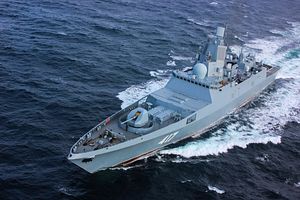By Franz-Stefan Gady
 The Admiral Gorshkov, lead ship of the Russian Navy’s new Admiral Gorshkov-class (Project 22350) of guided missile frigates, is expected to test fire the hypersonic 3M-22 Tsirkon or Zircon anti-ship missile (ASM) in April or May, according to a Russian defense industry source.
The Admiral Gorshkov, lead ship of the Russian Navy’s new Admiral Gorshkov-class (Project 22350) of guided missile frigates, is expected to test fire the hypersonic 3M-22 Tsirkon or Zircon anti-ship missile (ASM) in April or May, according to a Russian defense industry source.
“The frigate Admiral Gorshkov has left for the Belomorsk naval base for undergoing some maintenance work and also for loading a Tsirkon missile launcher,” the source was quoted as saying by TASS news agency on April 6. The source added: “[T]he hypersonic missile’s second test-firings are expected to be carried out from the ship in April-May.”
The Tsirkon ASM has previously been test fired from a canister launcher aboard the Admiral Gorshkov from the Barents Sea against a ground target at a distance of 500 kilometers in the Northern Urals in January of this year.
According to a separate source, three to four additional test launches from the Admiral Gorshkov will be conducted in the coming weeks. As I explained last month:
The Tsirkon hypersonic ASM is thought to be a variant of the P-800 Onyx ASM. The P-800 has a reported maximum speed of March 2.9 and a maximum range of up to 500 kilometers, while the Tsirkon, powered by a solid-propellant boost engine and supersonic combustion ramjet (scramjet), is thought to be capable of hitting targets at a distance of up to 1,000 kilometers. The longer range is reportedly partially due to a new fuel, Detsilin-M, specially designed for hypersonic cruise missiles.
The 5,400-ton (full) Project 22350 class were designed to be the mainstay of the Russian Navy’s surface fleet. A total of six Admiral Gorshkov-class frigates have now entered service or are in various stages of construction. The Severnaya Verf shipyard in St. Petersburg, part of the United Shipbuilding Corporation (USC), will lay down an additional series of Admiral Gorshkov-class frigates, the Russian Deputy Defense Minister, Alexei Krivoruchko, announced last month. As I noted elsewhere:
Armed with stand-off anti-ship and land-attack cruise missiles, the frigates are multipurpose platforms designed for anti-air, anti-surface, and anti-submarine warfare operations. The ships can alternatively carry the 3M-54 Kalibr, a stand-off supersonic anti-ship cruise missile, the P-800 Oniks over-the-horizon supersonic anti-ship missile, or the 3M22 Zircon anti-ship hypersonic cruise missile. The fifth and sixth ships of the class will reportedly carry 24 instead of the 16 anti-ship missiles carried on the preceding frigates.
As I explained in April last year:
The [Project 22350] is also armed with an RPK-9 anti-submarine rocket launcher, two 3M89 Palash close-in weapon systems, and an A-192 130-millimeter naval gun, in addition to the Polimut Redut air defense missile system, which may not be entirely functional. Additionally, it carries aKa-27PL helicopter for anti-submarine warfare missions. The frigate, powered by a combined diesel and gas turbine engine, can reach top speeds of up to 30 knots.
The Russian Ministry of Defense (MoD) also plans to test launch the 3M-22 Tsirkon ASM from its Project 855 Yasen-class multipurpose nuclear-powered attack/cruise missile submarine (SSN/SSGN) K-329 Severodvinsk. The Navy is reportedly expediting test launches of the new weapon system.
No comments:
Post a Comment